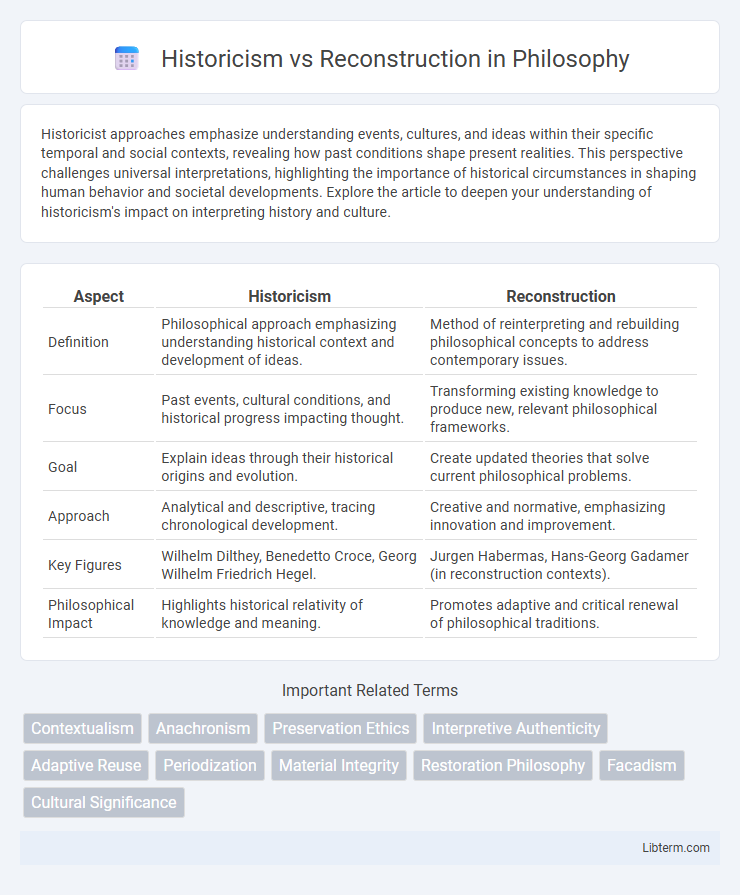Historicist approaches emphasize understanding events, cultures, and ideas within their specific temporal and social contexts, revealing how past conditions shape present realities. This perspective challenges universal interpretations, highlighting the importance of historical circumstances in shaping human behavior and societal developments. Explore the article to deepen your understanding of historicism's impact on interpreting history and culture.
Table of Comparison
| Aspect | Historicism | Reconstruction |
|---|---|---|
| Definition | Philosophical approach emphasizing understanding historical context and development of ideas. | Method of reinterpreting and rebuilding philosophical concepts to address contemporary issues. |
| Focus | Past events, cultural conditions, and historical progress impacting thought. | Transforming existing knowledge to produce new, relevant philosophical frameworks. |
| Goal | Explain ideas through their historical origins and evolution. | Create updated theories that solve current philosophical problems. |
| Approach | Analytical and descriptive, tracing chronological development. | Creative and normative, emphasizing innovation and improvement. |
| Key Figures | Wilhelm Dilthey, Benedetto Croce, Georg Wilhelm Friedrich Hegel. | Jurgen Habermas, Hans-Georg Gadamer (in reconstruction contexts). |
| Philosophical Impact | Highlights historical relativity of knowledge and meaning. | Promotes adaptive and critical renewal of philosophical traditions. |
Understanding Historicism: Core Principles
Historicism emphasizes preserving the original context, materials, and craftsmanship of historical structures to maintain their authenticity and cultural significance. This approach prioritizes detailed research and documentation to ensure any interventions align closely with the building's original era and architectural style. Historicism often contrasts with reconstruction, which may involve rebuilding lost elements, sometimes risking historical accuracy for aesthetic completeness.
The Foundation of Reconstruction: Key Concepts
The foundation of Reconstruction is rooted in addressing the aftermath of the Civil War by reintegrating Southern states and ensuring civil rights for freed African Americans. Key concepts include restoring the Union, redefining citizenship through the 14th Amendment, and establishing the Freedmen's Bureau to support formerly enslaved people. Historicism emphasizes understanding these efforts within their historical context, while Reconstruction focuses on tangible political and social reforms during the 1865-1877 period.
Origins and Evolution of Historicism
Historicism originated in the 19th century as a methodological approach emphasizing the importance of historical context and cultural conditions in understanding events, ideas, and social phenomena. It evolved through the works of thinkers like Johann Gottfried Herder and Wilhelm Dilthey, who advocated for interpreting history as a unique, organic process rather than a series of universal laws. This intellectual tradition laid the foundation for later debates on reconstruction, challenging the notion of replicating past architectural styles or cultural practices without considering their original historical significance.
The Emergence and Development of Reconstruction
The emergence and development of Reconstruction from 1865 to 1877 marked a transformative period in American history aimed at rebuilding the South and integrating formerly enslaved African Americans into society. This era introduced significant constitutional amendments, including the 13th, 14th, and 15th Amendments, which abolished slavery, granted citizenship, and protected voting rights respectively. Reconstruction's legacy includes both advancements in civil rights and a contentious socio-political struggle that shaped the future of race relations in the United States.
Methodological Differences: Historicism vs Reconstruction
Historicism emphasizes understanding artifacts and events within their original historical context, relying on primary sources and period-specific interpretations to preserve authenticity. Reconstruction focuses on recreating or restoring historical sites, objects, or narratives by combining available evidence with modern techniques to approximate original conditions. Methodologically, Historicism prioritizes contextual analysis and continuity, whereas Reconstruction employs practical replication often integrating scientific tools to fill gaps in historical records.
Application in Literary and Cultural Studies
Historicism in literary and cultural studies emphasizes understanding texts within their original historical contexts, focusing on the socio-political and cultural conditions influencing their creation. Reconstruction prioritizes the reinterpretation and revival of past narratives and cultural artifacts to address contemporary meanings and identities. Both approaches shape critical analysis by either grounding interpretation in historical authenticity or enabling dynamic reimagining of cultural heritage.
Impact on Historical Interpretation
Historicism emphasizes understanding historical events within their original context, promoting interpretations grounded in period-specific values and conditions. Reconstruction seeks to rebuild or replicate past environments or artifacts, often prioritizing physical accuracy and visual authenticity, which can influence public perception by creating tangible connections to history. The interplay between historicism and reconstruction shapes how historians and audiences interpret the past, balancing analytical depth with experiential engagement.
Critiques and Controversies Surrounding Both Approaches
Historicism faces critiques for its rigid adherence to past contexts, often limiting innovation and contemporary relevance in architecture and cultural preservation. Reconstruction sparks controversy due to debates over authenticity, as recreated structures may prioritize visual accuracy over original materials and historical integrity. Both approaches provoke discussions on the balance between maintaining heritage and adapting to modern needs, with critics questioning the ethical implications of altering or replicating historical sites.
Historicism and Reconstruction in Modern Scholarship
Historicism in modern scholarship emphasizes the importance of understanding historical context to interpret cultural artifacts and social phenomena accurately. Reconstruction, by contrast, involves the deliberate effort to restore or recreate historical sites and narratives, often using contemporary methods and interpretations. The ongoing debate centers on balancing authentic preservation with adaptive reconstruction to enhance historical comprehension and accessibility.
Choosing an Approach: Factors to Consider
Choosing between historicism and reconstruction involves evaluating factors such as the historical accuracy of available data, the intended purpose of preservation, and the cultural significance of the original structure. Historicism emphasizes maintaining authentic materials and original craftsmanship, while reconstruction often relies on modern techniques to replicate lost elements. Consideration of budget constraints, regulatory frameworks, and community engagement also plays a critical role in determining the most appropriate conservation approach.
Historicism Infographic

 libterm.com
libterm.com